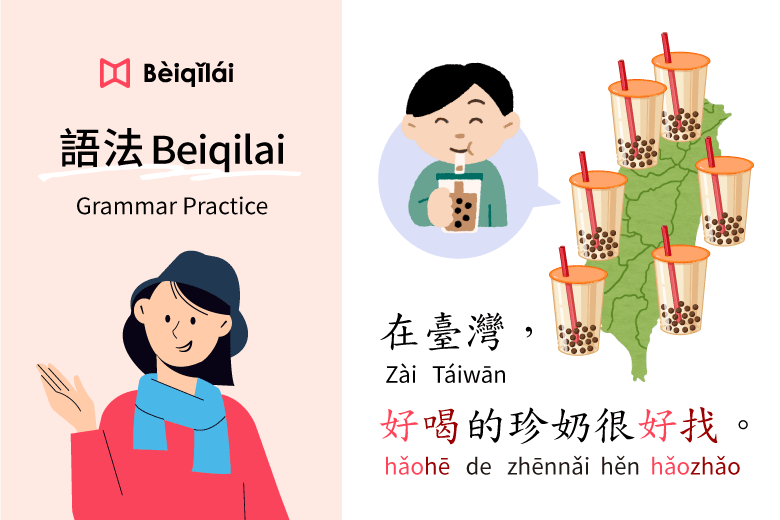Mandarin Chinese|Grammar Practice 01:Taiwanese tea is delicious|狀態動詞State Verb|形容詞Adj.|華語語法Beiqilai

00:00 Opening
00:10 好hǎo/難nán + Perception Verb
好吃hǎochī/難吃nánchī
(delicious, tasty / bad-tasting, unappetizing)
好喝hǎohē/難喝nánhē
(delicious (for drinks), tasty (for drinks) / bad-tasting (for drinks), unpleasant to drink)
好看hǎokàn/難看nánkàn
(good-looking, beautiful, attractive (for people or things) / unattractive, not good-looking)
好聽hǎotīng/難聽nántīng
(pleasant to listen to, melodious / unpleasant to listen to, harsh)
00:26 好hǎo/難nán + Action Verb 好學hǎoxué/難學nánxué
(easy to learn / difficult to learn)
好寫hǎoxiě/難寫nánxiě
(easy to write / difficult to write)
好做hǎozuò/難做nánzuò
(easy to do, simple to make / difficult to do, hard to make)
好找hǎozhǎo/難找nánzhǎo (easy to find / difficult to find)
00:42 Do practice!
--- 便宜的咖啡____。 Piányí de kāfēi ____.
(Cheap coffee ____.)
便宜的咖啡_很難喝_。 Piányí de kāfēi _hěn nánhē_.
(Cheap coffee ____.)
--- 日本菜____也____。 Rìběn cài ____ yě ____.
(Japanese food is both ____ and ____.)
日本菜_好吃_也_好看_。 Rìběn cài hǎochī yě _hǎokàn_.
(Japanese food is both delicious and visually appealing.)
--- 中國書法____可是____。
Zhōngguó shūfǎ ____ kěshì ____.
(Chinese calligraphy is ____ but ____.)
--- 中國書法_好看_可是_難學_。
Zhōngguó shūfǎ hǎokàn kěshì _nánxué_.
(Chinese calligraphy is beautiful but difficult to learn.)
中國書法_很好看_可是_不好學_。
Zhōngguó shūfǎ hěn hǎokàn kěshì _bù hǎoxué_.
(Chinese calligraphy is very beautiful, but it's not easy to learn.)
01:09 Do more practice!
--- Q:妳覺得這個電影怎麼樣? Nǐ juéde zhè ge diànyǐng zěnmeyàng?
(What do you think about this movie?)
A:我覺得這個電影很難看。 Wǒ juéde zhè ge diànyǐng hěn nánkàn.
(I think this movie is terrible.)
--- Q:你聽的那個歌怎麼樣? Nǐ tīng de nà ge gē zěnmeyàng?
(What do you think of the song you're listening to?)
A:我聽的這個歌好聽又好唱。 Wǒ tīng de zhè ge gē hǎotīng yòu hǎochàng.
(The song I'm listening to is pleasant to hear and easy to sing along to.)
--- Q:老師今天教的語法難不難學? Lǎoshī jīntiān jiāo de yǔfǎ nán bù nánxué?
(Is the grammar the teacher taught today hard to learn?)
A:老師教的語法很好學。 Lǎoshī jiāo de yǔfǎ hěn hǎoxué.
(The grammar the teacher taught is easy to learn.)
